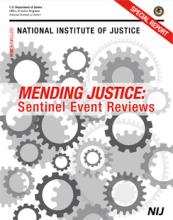Best practices
Mobile Evidential Breath Alcohol Instruments
NIJ and Jensen Hughes: Advancing the Forensic Analysis of Ignitable Liquid Fuel Fires
Common Operational Picture Technology in Law Enforcement: A Market Review
NIJ LEADS Program Increases Research Capabilities of Law Enforcement Officers
This video, produced for IACPTV, provides an overview of the NIJ Law Enforcement Advancing Data and Science (LEADS) program. NIJ LEADS Scholars from Dayton and Newark police departments provide an overview of the LEADS program as they describe their projects and experiences working in the program.
Hear from LEADS scholars Major Wendy Stiver, Dayton Police Department, and Captain Ivonne Roman, Newark Police Department.
See the YouTube Terms of Service and Google Privacy Policy
Financial Exploitation Intervention Team Evaluability Assessment
Minnesota Sexual Assault Kit Research Project
Do DOJ Intervention and Citizen Oversight Improve Police Accountability
Expert Panel Issues New Best Practices Guide for Cold Case Investigation
Expert Panel Issues New Best Practices Guide for Cold Case Investigations
Campus Sexual Assault Responses (CSAR): Informing Trauma-Informed Policies, Protocols, and Training
Notes from the Field: Leveraging Broadband Communications to Improve Public Safety
Mending Justice - Sentinel Events in Criminal Justice
Risk and Rehabilitation: Supporting the Work of Probation Officers in the Community Reentry of Extremist Offenders
Formative Evaluation of a City-Wide Hospital-Based Victims Services Intervention in Chicago
A Multifactorial Approach to Estimating Geographic Origin of Hispanics Using Cranial and Dental Data
The Viability of Virtual Peer Review and Microscopic Verification Versus Traditional On-site Review
Detecting and Processing Clandestine Human Remains with Unmanned Aerial Systems and Multispectral Remote Sensing
Tribal Justice, Tribal Court: Strengthening Tribal Justice Systems Using Restorative Approaches
Failure to Appear: Domestic Minor Sex Trafficking Victims Experience With the Juvenile Justice System and their Readiness to Change
Supporting States to Test Sexual Assault Evidence
Crime laboratory and law enforcement personnel from three states discuss the value the NIJ-FBI Sexual Assault Kit Partnership to test sexual assault evidence and obtain investigatory leads.
During this partnership, NIJ is working with the FBI Laboratory in Quantico, Virginia, to test eligible kits from law enforcement agencies and laboratories across the country and develop best practices that can improve the quality and speed of sexual assault kit processing.
See the YouTube Terms of Service and Google Privacy Policy
State Responses to Mass Incarceration
Researchers have devoted considerable attention to mass incarceration, specifically its magnitude, costs, and collateral consequences. In the face of economic constraints, strategies to reduce correctional populations while maintaining public safety are becoming a fiscal necessity. This panel will present strategies that states have undertaken to reduce incarceration rates while balancing taxpayer costs with ensuring public safety.
See the YouTube Terms of Service and Google Privacy Policy
Wrongful Convictions: The Latest Scientific Research & Implications for Law Enforcement
What does science tell us about case factors that can lead to a wrongful conviction? Dr. Jon Gould of American University will discuss the findings of the first large-scale empirical study that has identified ten statistically significant factors that distinguish a wrongful conviction from a "near miss." (A "near miss" is a case in which an innocent defendant was acquitted or had charges dismissed before trial). Following Dr. Gould's presentation, Mr. John R.
See the YouTube Terms of Service and Google Privacy Policy



